Zoo, or Letters Not about Love [Excerpt]
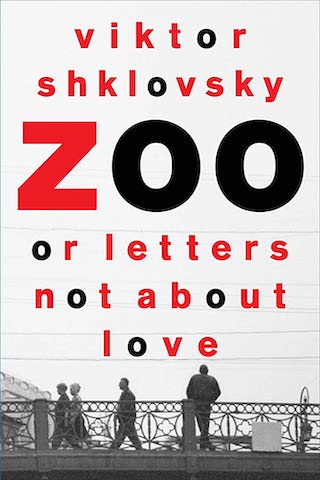 Forthcoming in a new “Dalkey Archive Essentials” version (with a different cover than the one depicted to the right), Zoo, or Letters Not about Love, translated from the Russian by Richard Sheldon, is one of Viktor Shklovsky’s most beloved works. An epistolary novel written while Shklovsky was in exile in Berlin—and in love with Elsa Triolet—it’s a book that’s all about love, but via metaphor and allusion, since Elsa (Alya in the novel) forbids him from writing about love. So, he writes about literature, living in exile, cars, everything but “love.”
Forthcoming in a new “Dalkey Archive Essentials” version (with a different cover than the one depicted to the right), Zoo, or Letters Not about Love, translated from the Russian by Richard Sheldon, is one of Viktor Shklovsky’s most beloved works. An epistolary novel written while Shklovsky was in exile in Berlin—and in love with Elsa Triolet—it’s a book that’s all about love, but via metaphor and allusion, since Elsa (Alya in the novel) forbids him from writing about love. So, he writes about literature, living in exile, cars, everything but “love.”
Included below are pieces from three letters: the one that Alya writes to set things in motion, one about overly ambitious publishing, and one that I dedicate to Elon Musk. Enjoy—and preorder!
(And if you like this, check out the other Shklovsky books in the Dalkey catalog. On the Theory of Prose, recently retranslated by Shushan Avagyan, is a fantastic place to start, and we will be reissuing a number of these, slowly but surely, over the next few years.)
*
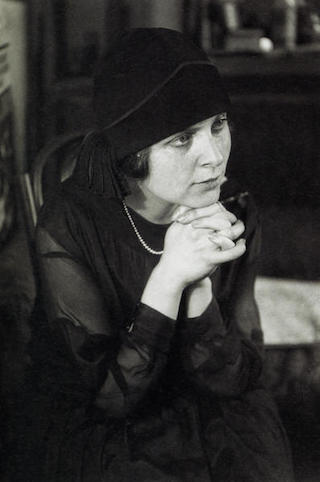 Letter Three
Letter Three
The second letter from Alya. In this one, Alya asks me not to write her about love. The letter is tired.
My dear, my own. Don’t write to me about love. Don’t. I’m very tired. As you yourself have said, I have come to the end of my tether. This daily grind pulls us apart. I do not love you and I will not love you. I fear your love; someday you will hurt me because of the way you love me now. Don’t carry on so. I still feel we have much in common. Don’t frighten me! As well as you know me, you still do all you can to frighten me, to repel me. Your love may be great, but it’s far from joyful.
I need you; you know how to bring me out of myself.
Don’t write me only about your love. Don’t make wild scenes on the telephone. Don’t rant and rave. You’re managing to poison my days. I need freedom—I refuse to account for my actions to anyone!
Yet you demand of me all my time. Be light-hearted or else you’ll fail at love. With each day, you grow more melancholy. You should go to a sanatorium, my dear.
I’m writing in bed, because yesterday I went dancing. Now I’m going to take a bath. Perhaps we’ll see each other today.
Alya
5 February
*
Letter Seven
About Grzhebin on canvas, about Grzhebin in the flesh. Since the letter is written in a penitent mood, the trademark of the Grzhebin Publishing House is affixed. Here too are several fleeting remarks about Jewry and about the attitude of the Jews toward Russia.
What to write about! My whole life is a letter to you.
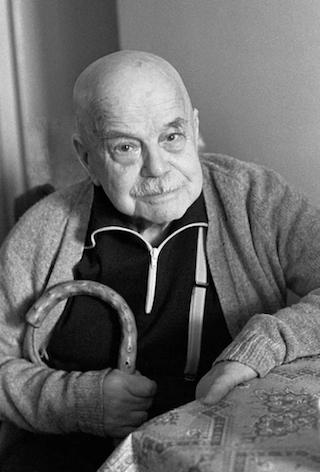 We meet less and less often. I’ve come to understand so many simple words: yearn, perish, burn, but “yearn” (with the pronoun “I”) is the most comprehensible word.
We meet less and less often. I’ve come to understand so many simple words: yearn, perish, burn, but “yearn” (with the pronoun “I”) is the most comprehensible word.
Writing about love is forbidden, so I’ll write about Zinovy Grzhebin, the publisher. That ought to be sufficiently remote.
In Yury Annenkov’s portrait of Zinovy Isaevich Grzhebin, the face is a soft pink color and looks downright delectable.
In real life, Grzhebin is pastier.
In the portrait, the face is very fleshy; to be more precise, it resembles intestines bulging with food. In real life, Grzhebin is more tight and firm; he might well be compared to a blimp of the semirigid type. When I was not yet thirty and did not yet know loneliness and did not know that the Spree is narrower than the Neva and did not sit in the Pension Marzahn, whose landlady did not permit me to sing at night while I worked, and did not tremble at the sound of a telephone—when life had not yet slammed the door to Russia shut on my fingers, when I thought that I could break history on my knee, when I loved to run after streetcars . . .
“When a poem was best of all
Better even than a well-aimed ball”
(something like that)
. . . I disliked Grzhebin immensely. I was then twenty-seven and twenty-eight and twenty-nine.
I thought Grzhebin cruel for having gulped down so much Russian literature.
Now, when I know that the Spree is thirty times narrower than the Neva, when I too am thirty, when I wait for the telephone to ring—though I’ve been told not to expect a call—when life has slammed the door on my fingers and history is too busy even to write letters, when I ride on streetcars without wanting to capsize them, when my feet lack the unseeing boots they once wore and I no longer know how to launch an offensive . . .
. . . now I know that Grzhebin is a valuable product. I don’t want to ruin Grzhebin’s credit rating, but I fervently believe that my book won’t be read in a single bank.
Therefore I declare that Grzhebin is no businessman, nor is he stuffed either with the Russian literature gulped down by him or with dollars.
But, Alya, don’t you know who Grzhebin is? Grzhebin’s a publisher; he published the almanac Sweetbriar, he published Pantheon and now he seems to have the most important publishing house in Berlin.
In Russia, between 1918 and 1920, Grzhebin was buying manuscripts hysterically. It was a disease—like nymphomania.
He was not publishing books then. And I frequently called on him in my unseeing boots and I shouted in a voice thirty times louder than any other voice in Berlin. And in the evening I drank tea at his place.
Don’t think that I’ve grown thirty times narrower.
It’s just that everything has changed.
I hereby give the following testimony: Grzhebin is no businessman.
Grzhebin is a Soviet-type bourgeois, complete with delirium and frenzy.
Now he publishes, publishes, publishes! The books come running, one after another; they want to run away to Russia, but are denied entry.
They all bear the trademark: zinovy grzhebin.
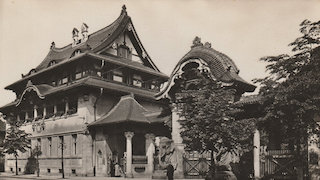 Two hundred, three hundred, four hundred—soon there may be a thousand titles. The books pile on top of each other; pyramids are created and torrents, but they flow into Russia drop by drop.
Two hundred, three hundred, four hundred—soon there may be a thousand titles. The books pile on top of each other; pyramids are created and torrents, but they flow into Russia drop by drop.
Yet here in the middle of nowhere, in Berlin, this Soviet bourgeois raves on an international scale and continues to publish new books.
Books as such. Books for their own sake. Books to assert the name of his publishing house.
This is a passion for property, a passion for collecting around his name the greatest possible quantity of things. This incredible Soviet bourgeois responds to Soviet ration cards and numbers by throwing all his energy into the creation of a multitude of things that bear his name.
“Let them deny my books entry into Russia,” says he—like a rejected suitor who ruins himself buying flowers to turn the room of his unresponsive beloved into a flower shop and who admires this absurdity.
An absurdity quite beautiful and persuasive. So Grzhebin, spurned by his beloved Russia and feeling that he has a right to live, keeps publishing, publishing, publishing. [. . .]
*
Letter Twenty-Six
About a mask, battery-powered, engines, the length of the hood on the engine of the Hispano-Suiza; some general comments on internal-combustion engines and about how the Hispano-Suiza automobile would wear rings in its ears if it were a human being. Speaking as a driver, I’ll say this: the letter is full of quiet fury and slander.
Today I woke up in the middle of the night. I was awakened by the incomprehensibility of the object in my hands.
The object proved to be a black paper mask and I found myself standing in the middle of the room.
It would clearly be a good idea for me to visit a sanatorium.
It’s bad for me to talk about love.
Let’s talk a bit about automobiles.
It’s sad to ride in taxis!
The saddest thing of all, though, is to ride in a car with an electric engine. It has no heartbeat; it is filled with heavy batteries and they are charged, but the plates will lose their charge and the engine will stop. I’ve started a lot of cars in my day; sometimes they hit me with their cranks. I’ve helped a lot of people get started.
Sometimes, even in Berlin, I feel like starting an engine which some driver is unable to handle. I did that twice, but the third time I made a most humiliating mistake.
I walked up to start the engine and it was electric, with a false radiator and, of course, no crank. How do you start a car that has no heart, no crank to turn? It even looks artificial, like false shirtfronts and cuffs; the hood is put in front supposedly to cover an engine, but inside, more than likely, is nothing but rags.
They pretend to be internal-combustion engines.
Poor Russian emigration!
It has no heartbeat.
In Berlin, it is impossible and improper to speak Russian loudly on the streets. Why, the Germans themselves hardly speak above a whisper. Live, they say, but keep quiet.
Cruise around town, without noise and without hope, in a dead, battery-powered automobile. Run, without breathing, through whatever you once possessed; then, once you run down, die.
Our batteries were charged in Russia; here we keep going around in circles and soon we will grind to a halt. The lead battery plates will turn into nothing but sheer weight.
The acid will turn rancid.
The Russian newspapers in Berlin smell of this rancid weight.
Rancid and weighty are the words I have written.
We’d better talk about types of automobiles.
Do you like the Hispano-Suiza, Alya?
What a mistake! Don’t give yourself away.
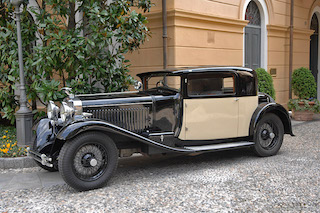 You love expensive things and you would gravitate to the most expensive things in any store even if all the price tags were scrambled the night before. The Hispano-Suiza? It’s a bad car. An honest, noble car with a true stroke, a car with the driver sitting on one side to flaunt his impotence—that’s the Mercedes, the Benz, the Fiat, the Delaunay-Belleville, the Packard, the Renault, the Delage, and the very expensive but formidable Rolls-Royce, which has an unusually supple stroke. In all these cars, the design of the body follows the structure of the engine and the transmission; moreover, the design is calculated to minimize air resistance as much as possible. Racing cars usually have long noses, high in front: this particular shape, at high speed, offers the least resistance to the atmosphere. Have you ever noticed, Alya, that a bird flies with its blunt breast forward, not its pointed tail?
You love expensive things and you would gravitate to the most expensive things in any store even if all the price tags were scrambled the night before. The Hispano-Suiza? It’s a bad car. An honest, noble car with a true stroke, a car with the driver sitting on one side to flaunt his impotence—that’s the Mercedes, the Benz, the Fiat, the Delaunay-Belleville, the Packard, the Renault, the Delage, and the very expensive but formidable Rolls-Royce, which has an unusually supple stroke. In all these cars, the design of the body follows the structure of the engine and the transmission; moreover, the design is calculated to minimize air resistance as much as possible. Racing cars usually have long noses, high in front: this particular shape, at high speed, offers the least resistance to the atmosphere. Have you ever noticed, Alya, that a bird flies with its blunt breast forward, not its pointed tail?
The length of an engine’s hood is determined, of course, by the number of cylinders (four, six, occasionally eight or twelve) and by their diameter. The public is used to long-nosed cars. As for the Hispano-Suiza, it has a long stroke; that is, there’s a great distance between the top and bottom centers of gravity. This car is extremely dubious and forced, so to speak—a cocaine sniffer if there ever was one. Its engine is high and narrow.
That’s its own private affair.
But the hood is long.
Thus the Hispano-Suiza uses its hood as a disguise: there is a space of almost two feet between the radiator and the engine. That two feet is a lie made expressly for snobs; that two feet is a violation of good design and it infuriates me.
If I ever come to despise you, if I ever sing . . .
Disappear, you paths
On which I trod!
. . .then I will consign my memory of you not to the devil, but to that void inside the Hispano-Suiza.
Your Hispano-Suiza is expensive, but worthless. Its chassis often comes with folding seats instead of doors. That must appeal to gigolos.
The steering wheel is set at an indecent angle; if the Hispano-Suiza were a man, it would have rings in its ears. Your Hispano-Suiza has its radiator in the wrong place. It runs around in false cuffs. It will never love you. All this I find more interesting than the life and times of the Russian emigration.
However, the Hispano-Suiza does hold the record for distance covered in mountainous terrain.
*
All excerpts from Zoo, or Letters Not about Love by Viktor Shklovsky, translated by Richard Sheldon (Dalkey Archive Press)

Leave a Reply